- Home
- Gore Vidal
Death in the Fifth Position Page 2
Death in the Fifth Position Read online
Page 2
“Miss Flynn, I have been hired.”
“The dancers?” She looked at me, her gray lips tight. Women in tights are dancers to her, not ballerinas.
“For two weeks, starting now.”
“I am very happy for you, Mr. Sargeant,” she said, in the tone of one bidding a friend farewell on the banks of the Styx.
“I’m happy, too,” I said. I then gave her a few instructions about my other accounts (a hat company in the Bronx, a television actress and a night school); then I left my one-room Madison Avenue office and headed for the Metropolitan Opera House, leaving my conscience behind.
Mr. Washburn met me at the stage door and escorted me past several open dressing rooms to a flight of steps which led down to the vast stage itself. Everything was in great confusion. Small fat women ran back and forth carrying costumes, while dancers in tights stood about practicing difficult variations with the intensely vacuous expressions of weight-lifters or of those restaurant cooks who scramble eggs in front of plate-glass windows. Workmen, carrying parts of scenery, shouted to one another and cursed the dancers who seemed always to be in their way. In the pit the orchestra was making an awful noise warming up, while, beyond, the great red and gold opera house was empty and still … a little ominous, I thought, for no reason at all.
“The rehearsal is almost ready to begin,” said my employer as we moved out onto the stage, toward a group of dancers in tights and T-shirts, the standard rehearsal costume of both boys and girls, which was very nice I thought, looking at the girls. “I’ll introduce you to the principals in a minute,” said Mr. Washburn. “If you …” But then someone waved to him from the other side of the stage and he walked away, leaving his sentence unfinished.
“Are you the new boy?” asked a female voice behind me.
I turned and saw a very pretty girl standing behind me; she wore black tights and a white T-shirt through which her breasts showed, small and neat. She was combing her dark gold hair back. For some inscrutable reason she had a rubber band in her mouth; it impaired her diction.
“Well, I guess in a way I am,” I said.
“You better get your clothes off. I’m Jane Garden.”
“My name’s Peter Sargeant.”
“You better hurry. You’ve got to learn the whole thing this afternoon.” She pulled her hair straight back and then slipped the back hair through the rubber band; it looked like a horse’s tail, a very nice horse’s tail.
“Shall I take them off right here?”
“Don’t be silly. The boys’ dressing room is on the second floor.”
I then explained to her who I was and she giggled, but not in a squeaky manner: her voice was low and her eyes, I noticed, were a fine arctic blue.
“Do you know anything about ballet?” she asked, glancing anxiously toward the other dancers. They were not ready, however. The orchestra was still warming up. The principals hadn’t arrived yet. The noise was deafening.
“Not much,” I said. “Are you one of the leads?”
“Nowhere near being a lead. Although they’ve made me understudy in this ballet.”
“To whom?”
“Why, to Ella Sutton. She’s the star of the ballet … I mean of this particular one. Actually she’s the second-ranking ballerina … after Eglanova.”
I knew who Eglanova was. Everyone, I suspect, who has ever heard of ballet knows about Anna Eglanova. I had even read up on her that morning before my interview with Mr. Washburn, just so I wouldn’t appear too ignorant. The program notes and the facts, however, did not coincide as I found out soon enough … even though the program is approximately correct; she was a star at the same time as Nijinski and she is a genuine Russian dancer from the old Imperial School, but she is fifty-one not thirty-eight and she has been married five times, not once, and she was not the greatest ballerina of the Diaghilev era; as a matter of fact she was considered the least promising of the lot: how were her contemporaries to know that she had joints like ball bearings and a pair of lungs like rubber water wings and that with this equipment she would outlive all her generation, existing finally as a legend whose appearance on a stage was enough to break up a whole audience, causing tears of nostalgia to come to the eyes of characters who never saw a ballet before the last war.
“Where is Sutton?” I asked.
“Over there, talking to Wilbur … in the wings.”
Sutton was a good-looking woman, with hair dyed jet-black and worn severely combed back with a part in the middle: the classic ballerina fashion. She had large but good features and a vividly painted face; she was in costume, a full-skirted white dress with red roses in her hair. Her body was good for a female dancer though the muscles tended to bunch a little unpleasantly at the calves. Jane Garden’s did not, I noticed.
“Why aren’t you in costume?” I asked. “Isn’t this the dress rehearsal?”
“My costume isn’t ready. I wish they’d hurry up and start.”
“Why don’t they?”
“I suppose they’re waiting for Louis … Louis Giraud, he’s the first dancer and he’s always late. He sleeps most of the time. It drives everyone crazy … especially Wilbur.”
“Why doesn’t he do something about it?”
“Who? Wilbur? Why, he’s in love.”
“In love?”
“Of course … everybody knows it. He’s just crazy about Louis.”
Well, this is ballet, I decided, making a mental note to keep Miss Flynn in complete darkness as to the character of my new associates.
“I wonder,” I said thoughtfully, sincerely, “if you might perhaps have a minute after the show tonight … we might go somewhere and have something to eat. You see,” (speaking quickly now, gathering momentum), “I have to learn an awful lot about ballet very fast. It would help if you were to explain it all to me.”
“You’re sweet,” said Miss Garden with an unexpected smile, her teeth shone glacier-white in her warm pink face. “Maybe I will. Oh, here comes the conductor. You better get out of the way now … we’re going to start.”
Mr. Washburn collected me at that moment and we went around to the front of the house. Here I was introduced to a number of patrons and hangers-on, as well as the regisseur or director of the company, Alyosha Rudin, a nice old man, and the set designer whose name I didn’t get.
Jed Wilbur, a thin prematurely gray young man, came out on stage and began to lecture the dancers in a high nasal voice. They looked very pretty I thought. The girls in gray with pink roses in their hair and the boys dressed like 1910. But all was not ready.
“Where’s Louis?” asked Wilbur suddenly. “Doesn’t he know this is dress rehearsal?”
“He’s always late,” said Ella, fixing one of her false eyelashes in place. “I suppose he’s sleeping.”
“Just resting my legs,” said Louis, ambling out onto the stage with that funny duck-like walk all dancers have from continually turning their feet out. He was a big-boned man, about thirty and, for a dancer, rather tall and muscular, with black curly hair and blue eyes.
“Why can’t you ever be on time?” complained Wilbur, the eye of love eclipsed by the greater love of art and reputation; this was obviously an important moment for him, a major work … all the critics would be out front tonight and maybe even Margaret Truman.
“I get here, Jed. Now you start.” Ella glared at him. Wilbur muttered something disagreeable. Then the overture began.
The set was a handsome one. A blue sky, which was dark when the curtain rose, gradually filled with light as the music swelled and the corps de ballet (eight boys and eight girls) appeared. In the center of the stage was a large rock of gray canvas while at the top of the blue sky, about forty feet up, was a yellow Van Gogh sun.
The plot, if Eclipse could be said to have a plot, seemed to be about a girl (Sutton) who was in love with a boy (Louis) who liked all the girls in the company except her. So, frustrated and miserable, she took her revenge when, not having been laid as she so dearly wante
d, she rushed furiously away from the happy boys and girls who at this point were indulging in some pretty sophisticated fornication on stage (so stylized, however, that one’s grandmother would never suspect what was happening); for a few dozen bars Ella hid behind the rock while Louis did his solo. Then, when he was finished, she reappeared and with a look of sheer malevolence slowly ascended into the air, spinning like an avenging spirit until she had at last eclipsed the sun. It was quite a tour de force, I thought … in spite of the dress rehearsal which was sufficiently godawful to make everyone think that tonight’s performance would be a technical triumph: Louis dropped Ella in the midst of a complicated lift shortly after her entrance and they never got back with the music again, while the corps de ballet plunged wildly about in the best St. Petersburg tradition, knocking into scenery and one another, justifying all the cruel remarks I’d heard made about them by the more refined balletomanes.
“What do you think?” asked Washburn when the rehearsal ended.
“Wonderful!” I said, like a press agent.
“I think …” began Mr. Washburn, but he was not allowed to finish because they were having a row on stage. The curtain had remained up and the lights were on again. Louis, stretched out with his back to the proscenium, was carefully wiping the sweat from his face with a piece of Kleenex. The boys and girls stood puffing at the rear of the stage while Ella and Wilbur quarreled.
“You’ve got to change it, Jed. I insist. I will not go sailing up on that damn thing again.”
“It’s the whole point to the ballet.”
“So what? I won’t do it. I get dizzy and I can’t make those turns off the ground.”
“We can have one of the workmen turn you backstage … he’ll jerk the cable …”
“Oh, no he won’t!”
“The idea never seemed to bother you before.”
“The idea still doesn’t bother me. I never realized how high it was until now.”
“Why don’t you get her a net?” suggested Louis.
“And that lift!” she said furiously, turning on him. “I could have broken a leg. You did it deliberately. I swear he dropped me deliberately.”
Mr. Washburn let them fight it out a few minutes more; then he went up on the stage, accompanied by me, and quickly made peace. It was agreed that Ella would ascend by cable tonight, but more slowly than before, and, further, she would not have to turn in the air.
“Very statesmanlike,” I said to Mr. Washburn, as we moved toward the dressing rooms on the north side of the stage.
“We always have these little disagreements before a première … divertissements I like to call them.” Despite his attempt at lightness, however, he seemed not at all diverted. “Have you had any ideas yet about those pickets?”
I nodded. “I’ve already called Elmer Bush at the Globe … that’s where I used to work … and he’s doing a column called ‘Witch-Hunt in the Theater,’ all about Wilbur and the ballet.”
“First-rate,” said Mr. Washburn, obviously impressed. I made a mental note to call Elmer Bush and suggest such a column to him. For all I knew he might even do it.
“I would rather wait until after we see the pickets before I do anything more. I mean we may get a lead from them … you know, something about bad behavior, bullying is un-American, that kind of thing. By the way,” I added, “speaking of bad behavior, does Miss Sutton often make scenes like this?”
“Not often,” said Mr. Washburn, as we approached a dressing room with a dusty star on the door. “She usually saves them for her husband.”
“Her husband?”
“Miles Sutton. He’s the conductor … big fellow with the beard.”
My head was beginning to spin. Everyone was related to everyone else, either officially or unofficially. I couldn’t keep them straight. The ballerina Ella Sutton was the wife of the conductor Miles Sutton and the choreographer Jed Wilbur was in love with the lead dancer Louis Giraud and Jane Garden the understudy to Ella Sutton was my idea of a fine specimen while Anna Eglanova the prima ballerina stood before me naked from the waist up. It was disconcerting. I was standing beside Mr. Washburn in the doorway of her dressing room; her maid had suddenly opened the door and darted by, leaving her mistress exposed to our gaze.
“Come in, Ivan,” said the great ballerina. “Who is the young man?”
“Peter Sargeant, Anna, our new public relations man.”
“So young! Ah!” She sat down before her dressing table and began to arrange her hair. She looked young for fifty. Her body was firm … the skin like antique ivory and the breasts more like worn china door knobs than glands intended for the suckling of the young. Her neck was slightly corded and her face was ugly but exotic, with deep lines about the mouth, a beaked nose and narrow slanting Mongol eyes. Her hair was dyed dark red.
“I get ready now for pas de deux, Ivan.” Her English was so heavily accented that it sounded to me like a different language altogether. In fact everything about her was different, including her casual disregard for the conventions.
“I think I better go,” I said, a little hastily. “I’ve got some calls to make. I’m going to try and head the newspaper photographers off.”
“Good plan,” said Mr. Washburn.
“Nice boy,” said Anna, as I left.
Halfway down the hall, a loud voice said, “Hey, Baby, come in here.”
Now I am twenty-eight years old and shave every day of my life and, though I wear a crewcut in deference to my collegiate past, I flatter myself that I look every inch a man of the world. But Louis Giraud obviously had about as much respect for other men as Don Juan had for little girls so I controlled myself. I walked into his dressing room.
He was lying on a steel cot. He had an electric fan going just above his head and a pair of sweaty tights were hanging over the radiator to dry. He wore nothing except a towel around his middle.
I said, “Hi.”
“You like the ballet tonight?” He spoke good English with only a faint French accent; he had started life as a longshoreman in Marseille. No one knew how he had got started in ballet but I suspect that the rumor a certain rich gentleman discovered him in a bordello and took him to Paris was probably true.
“I liked it pretty good,” I said.
“Real lousy,” said Louis, stretching his long knotty legs until the joints cracked. “I hate this ugly modern stuff. Giselle was good enough for Nijinski and it’s good enough for me. All these people running around stage with funny faces. Merde!” He had a deep voice and he wasn’t at all like the other boys in the company who were inclined to be rather tender: Louis had shoulders like a boxer. I decided I wouldn’t like to tangle with him and so I sat near the open door, ready to make a quick exit if he should decide to tear off a quick piece.
“Well, it’s a new medium,” I said absently, noting the comic books and movie magazines on the floor by the bed. Each to his taste, I said to myself in flawless French.
“But it’s not ballet.” Louis looked at me and grinned. “Hey, why’re you trying to fool me, Baby?”
I measured the distance from my chair to the door: two long steps or one broad jump, I decided coolly. “Who’s trying to fool you?” I asked, getting up slowly with a look of innocence which would have done credit to Tom Sawyer. He was too quick for me, though. I made a leap for the door but he got there first. It was a very silly moment.
“Now, look here, Louis,” I said as he made a grab for me. We played tag a moment and then he grabbed me, holding me the way a boxer holds another boxer in a clinch and both of us trying not to make any noise, for different reasons. I wondered whether to knee him or not; the towel had fallen off. I decided against it for the good of the company. I would be fired if I did. On the other hand I was in danger of being ravished; I couldn’t move without seriously injuring him and, on the other hand, I couldn’t stand like this forever pressed against his front while he fumbled and groped with his one free hand, embarrassing me very much. He smelled like a ho
rse. Controlling myself with great effort I said in a very even and dignified voice, “If you don’t let go of me, I will break every one of your toes.” And with that, fairly gently, I put one hard leather heel on top of his left foot. He jumped at that and, breathing hard, I slid out the door.
I was mad as hell for several minutes but then, since no damage was done, I began to see the funny side and as I walked across the stage to the other set of dressing rooms I wondered if I should tell Jane what had happened. For one reason and another I had decided not to when I came upon Miles and Ella Sutton, quarreling. He was standing in the door of her dressing room; she was sitting at her make-up table in an old gray bathrobe. I caught one quick glimpse of her as I walked by, as though on urgent business. I have found that people who hang around to watch fights usually end by getting involved.
As I walked by, however, I heard Miles Sutton threatening to kill his wife. It gave me quite a turn. I mean temperament is all very well but there are times when it can be carried too far.
3
Now that I look back on that night it is perfectly apparent to me that almost everyone, including myself, sensed that something serious had gone wrong … but what? I knew of course that there was always a great deal of tension before a première and the childish bad temper of ballet dancers was familiar to me, by reputation anyway. Yet when the curtain went up on the blue-lit stage for the first ballet of the evening, Swan Lake, I had a knot in the pit of my stomach.
I remember taking a good look at the audience just before the house lights were dimmed and I remember feeling thankful that I didn’t have to appear on a stage in front of all those people, for the interior of the Met, seen from the stage, is like the mouth of a great monster, wide open, yawning and red, with tiers of golden teeth.

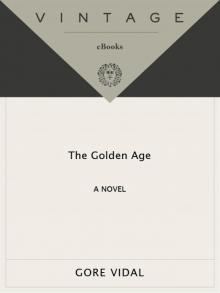 The Golden Age: A Novel
The Golden Age: A Novel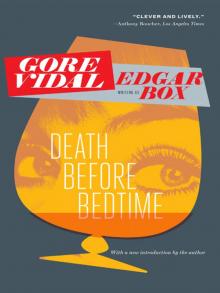 Death Before Bedtime
Death Before Bedtime Burr
Burr The Last Empire
The Last Empire Empire: A Novel
Empire: A Novel The Selected Essays of Gore Vidal
The Selected Essays of Gore Vidal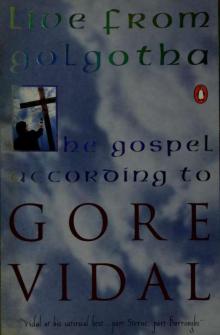 Live From Golgotha
Live From Golgotha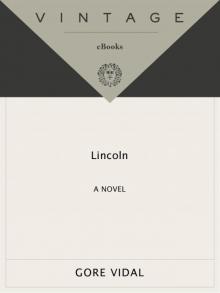 Lincoln
Lincoln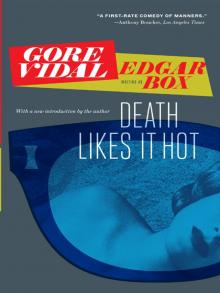 Death Likes It Hot
Death Likes It Hot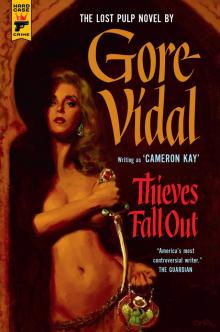 Thieves Fall Out (Hard Case Crime)
Thieves Fall Out (Hard Case Crime) Point to Point Navigation
Point to Point Navigation Williwaw
Williwaw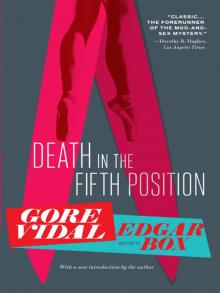 Death in the Fifth Position
Death in the Fifth Position In a Yellow Wood
In a Yellow Wood Julian
Julian Hollywood
Hollywood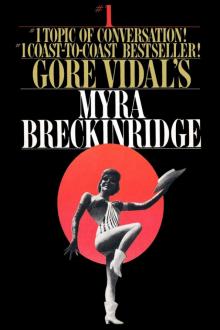 Myra Breckinridge
Myra Breckinridge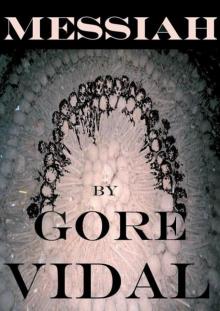 Messiah
Messiah The Second American Revolution and Other Essays 1976--1982
The Second American Revolution and Other Essays 1976--1982 Homage to Daniel Shays
Homage to Daniel Shays Empire
Empire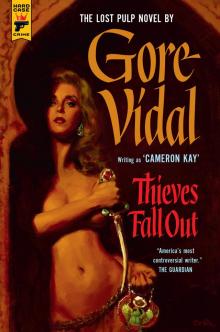 Thieves Fall Out
Thieves Fall Out 1876
1876 The City and the Pillar
The City and the Pillar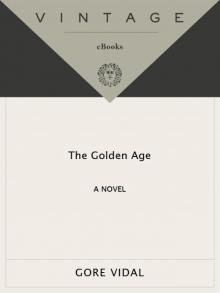 The Golden Age
The Golden Age At Home
At Home